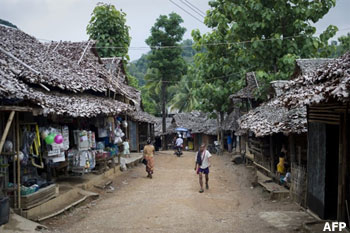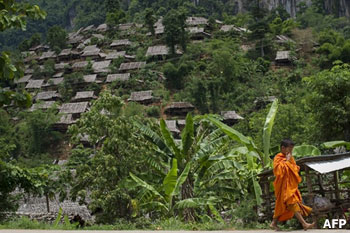Countries around the world are continuing to offer new homes to Burmese refugees, most of whom are war refugees. Karen refugees walk inside the Mae La refugee camp, about 90 kms from Mae Sot on the Thai-Burmese border...
Chiang Mai (Mizzima) – Countries around the world are continuing to offer new homes to Burmese refugees, most of whom are war refugees.
 A total of 65,000 Burmese refugees living in nine border-based refugee camps have resettled in the past four years, the Thai- Burma Border Consortium (TBBC) said in a recent report.
A total of 65,000 Burmese refugees living in nine border-based refugee camps have resettled in the past four years, the Thai- Burma Border Consortium (TBBC) said in a recent report.
There are 11,107 more refugees still waiting to be resettled in third countries.
The logistics involved the International Organization of Migration (IOM), which works with the TBBC in supporting refugees who resided in camps including Maela, Umphan, Thanhim, Noboe, Bandongyan, Maelaoo, Maeramo and camp No. 1 and 2.
The refugees, mainly Karenni, found homes in third countries including the US, Canada, Australia and other countries.
A breakdown of refugees by countries included 9,538 refugees accepted by the US; 857 by Australia; 339 by Canada; 123 by Finland; 80 by Sweden; 50 by Netherlands; 50 by Norway; 27 by Japan, four by Britain; five by New Zealand, eight by Denmark; and 26 by other countries.
Saya George, the Karen Refugee Committee secretary, said most of the refugees usually find work in factories after learning the language and lifestyle of their host countries.
 The TBBC is a consortium of NGO organizations which provide food, shelter and medicine to 140,452 refugees along the border. The TBBC report said that the rising cost of food and other commodities is making providing aid to the refugees much harder.
The TBBC is a consortium of NGO organizations which provide food, shelter and medicine to 140,452 refugees along the border. The TBBC report said that the rising cost of food and other commodities is making providing aid to the refugees much harder.
In addition to refugee aid on the Burma-Thai border, the United Nations High Commissioner for Refugees (UNHCR) in New Delhi offers aid for six months to more than 4,000 refugees recognized by UNHCR.
The New Delhi-based Chin Refugee Committee chairman Steven Ral Kap Tluang told Mizzima that UNHCR has stopped its cash assistance program for now.
‘The refugees are facing a lot of difficulties in food and shelter, and they have to do whatever work is available for them in order to get by’, he said.
He said that there are about 70,000 more unrecognized Burmese refugees in towns and cities along Indo-Burmese border.


